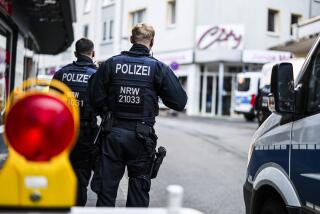Bonn Keeps Options Open on Beirut Abductions
BONN — West German Chancellor Helmut Kohl met Thursday with government leaders to brief them on the two West German citizens reported kidnaped in Beirut, both in apparent retaliation for the arrest here of a suspected airline hijacker.
The government placed a news blackout on the discussions with party leaders on the crisis, which began developing when the first kidnaping occurred only a week before West Germany’s national election this Sunday.
“Basically, the government is playing for time,” said one source after the meeting. “All options are being kept open.”
West Germany urged its citizens to leave Lebanon, and a Beirut police spokesman said the last three West German families in Muslim West Beirut were evacuated to the city’s Christian eastern sector, wire services reported.
Waite in Secret Negotiations
And Anglican Church envoy Terry Waite sent word from a secret location that he was in the second day of negotiations with kidnapers holding American hostages, wire services said.
Waite, personal envoy of Robert A. K. Runcie, the Archbishop of Canterbury, has been in Beirut since Jan. 12 on his fifth mission on behalf of the hostages. According to members of the Druze militia who have guarded Waite in Beirut, he went underground Tuesday night to meet with members of Islamic Jihad (Islamic Holy War), the Shia Muslim group that holds two Americans.
West German officials said a written message in Arabic was received Monday from people claiming to have abducted Rudolf Cordes, 53, a chemical firm employee, in Beirut last Saturday.
They said that West Germany responded with a request for a sign that Cordes is alive but had not yet received a response.
Government sources revealed that the kidnapers have insisted that Mohammed Ali Hamadi be freed in return for the release of Cordes.
The kidnapers are believed to be Shia Muslims who want to prevent West Germany from extraditing Hamadi, a Lebanese who was arrested at Frankfurt airport Jan. 13 while carrying explosives, the officials said, requesting anonymity.
Hamadi, 22, is wanted in the United States on charges of murder and air piracy in the June, 1985, hijacking of a TWA jetliner to Beirut. U.S. Navy diver Robert Dean Stethem was killed, and 39 other Americans were held captive for 16 days by terrorists belonging to the Shia Muslim group Hezbollah (Party of God.)
A West German engineer, Alfred Schmidt, is missing from his Beirut hotel, and Lebanese police say he was kidnaped Wednesday. However, West German officials said no group has been in touch with them concerning Schmidt, and they are not sure if he is a kidnaping victim.
Chancellor Kohl declined to give public assertions that his government will refuse to deal with the kidnapers.
Equivocal Stance
West Germany’s equivocal stance may bring it in conflict with the United States, which has asked for the rapid extradition of Hamadi.
There were unconfirmed reports Thursday that Hamadi is the brother of Abdul-Hadi Hamadi, a senior security official in Hezbollah and that Abdul-Hadi planned the abductions in Beirut as leverage to gain his brother’s freedom.
In Washington, Atty. Gen. Edwin Meese III predicted that West Germany will hold firm against the terrorists, declaring, “The world is witnessing something very vital in the fight against international terrorism--an exercise of will, political will, by two nations, the United States and the Federal Republic of Germany.”
But on Thursday, German government sources said that the legal procedures involved in extradition might take weeks to complete, and the sources privately added that there was therefore no rush to process the application.
German political opinion seemed divided on how to proceed in the kidnaping incident.
Hans-Jochen Vogel, a leader of the opposition Social Democrats, declared that Bonn must not bow to terrorist demands.
But other politicians said privately that it might be necessary to ransom Hamadi in exchange for the lives of the two West Germans.
The seriousness with which the government regards the case was reflected in the fact that Kohl called in members of the opposition Social Democrats to discuss the situation Thursday.
He deliberately barred members of the radical Greens party from the talks, on security grounds, and they objected to being excluded.
At the Munich Olympics in 1972, Bonn appeared willing to turn over Palestinian prisoners for Israeli hostages, but West German security troops opened fire on the terrorists at the airport, resulting in the deaths of Israeli athletes and the Palestinian terrorists holding them.
In 1977, a crack West German commando outfit successfully freed passengers in a hijacked Lufthansa jet after storming the plane in the Somali capital of Mogadishu.
But in 1983, the government returned two accused Libyan kidnapers to Libya after Col. Moammar Kadafi arrested eight West Germans as spies in retaliation for the Libyans’ arrests.
More to Read
Sign up for Essential California
The most important California stories and recommendations in your inbox every morning.
You may occasionally receive promotional content from the Los Angeles Times.










